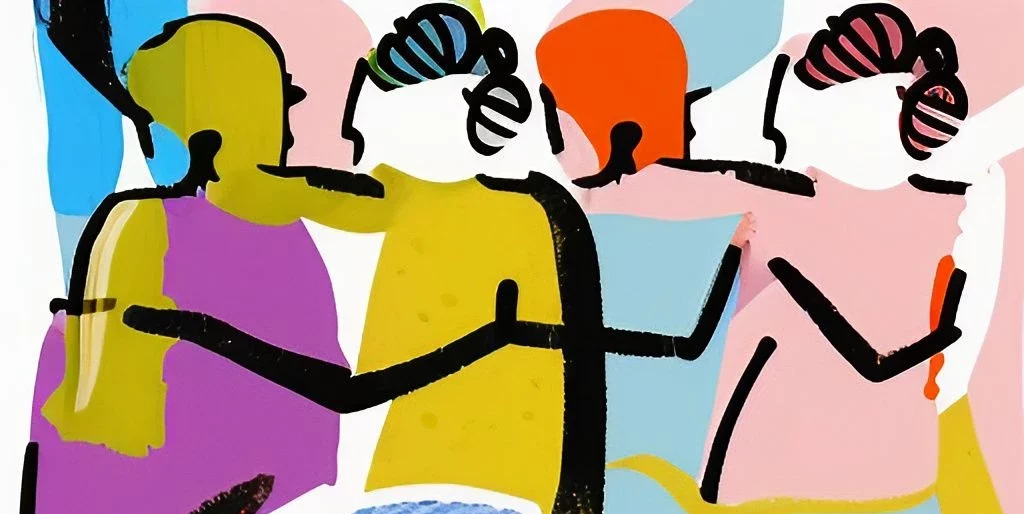Navigating Any Feelings of Grief & Loss Throughout Your Loved One’s Gender Transition

Am I the only person who felt a loss when I learned my loved one needed to transition? How is it possible for me to be grieving the loss of my loved one after they shared their need to gender transition, even though they are alive and present in my life? Is there something wrong with me if I don’t have any thoughts of grief or loss throughout my loved one’s gender transition? How am I able to feel happy for my loved one as they embrace their affirming gender and yet still miss aspects of their gender assigned at birth?
It is not uncommon for partners, parents, and family members to experience some level of grief and/or loss while they navigate the gender transition of their loved one. It is important to recognize that not all companions* feel a sense of grief or loss throughout this process immediately or if ever. There is no hard rule about this, but those that do experience grief/loss have stated it was a very painful time in their life. For these individuals, it can be quite helpful that their expressed grief/loss is both heard and acknowledged. Though the partner or family member’s presence is often in their life, some have reported that they consider their loved one’s need to transition akin to a death. It may appear to be an invisible loss to many, but it is extremely real to those experiencing these feelings of a death. For others, it can be more described as a difficult loss which could encompass a multitude of factors or simply a few.
*Whenever it states companions, it refers to partners, parents, family members, and friends.
5 Stages of Grief: What Companions May Feel
When companions discuss grief/loss, it seems to be aligned with the five stages of grief Elisabeth Kübler-Ross framed: denial, anger, bargaining, depression, and acceptance. This is how the stages may apply to the companions’ experience:
- Denial: Some companions have said that they believed their loved one was “only going through a stage” when their loved one expressed their need to transition. Whether a partner, parent, or family member feels this way or not, it is essential that they respect their loved one’s words and recognize that understanding one’s own gender can be complicated so providing your support is critical. As your loved one is questioning their gender or is certain of who they are, it is very important that they do not feel unheard or dismissed.
- Anger: This can take on many forms and be directed in a variety of ways. Several companions have voiced they were upset with their loved one. In some cases, their need to transition required their partners, parents, and family members to discuss topics and navigate changes that were unfamiliar, painful, confusing, scary, and filled with unknowns for them. In many instances companions spoke of being angry with themselves for feeling, sad, lost, helpless, and upset with their loved one. Moreover, they were often frustrated about not knowing what to say or do once they learned that their loved one needed to transition. In addition, there were companions who explained that they were aggravated with themselves which often manifested as anger since they were unsure of whom to talk to and what to tell others, if anything.
- Bargaining: Companions have told of times they requested their loved one to make “deals” such as asking them to only express their affirmed gender and/or only use their affirming name and pronoun at home, but not at any other time. Another way some companions bargained was to propose an “agreement” that their loved one only socially transition but “consent” to never medically transitioning.
- Depression: Numerous companions have spoken of an acute sense of grief/loss and/or a deep sadness, sometimes resulting in them asking for time off from work or being unable to attend professional/social commitments. Many of these companions said they were emotionally drained and/or physically exhausted while they were adjusting to the newness of their loved one’s gender transition. Others described their rollercoaster array of emotions that at times left them feeling depressed, lost, alone, lonely, and/or fearful of their loved one’s safety and/or future.
- Acceptance: This stage has been described as having the realization that their loved one’s gender transition is going to happen. Knowing their loved one will transition and being happy about it are not always aligned. It is strongly suggested that if you cannot accept and honor your loved one’s affirming gender, you can help them find the support, resources, and tools they will need to move forward with their gender transition. When and if you can be a part of their support team may not be known to you now, but not hindering or preventing it is a crucial aspect of acceptance.
As with all grief/loss, these stages may not appear in any particular order and/or can occur more than once. Some companions have acknowledged that they did not experience all the stages but felt one or two of the stages with great intensity. It is key to not ignore what you are feeling and find the support you need to not feel alone or suffer in any way.
Partners
There are several ways some partners may feel grief/loss when their partner/spouse takes the necessary steps to live in their affirmed gender. One major area that partners have shared triggers the most angst for them is in relation to sex and/or intimacy. The possible medical changes in their spouse/partner’s body in connection to the way they look, sound, smell, taste, and may feel to the touch can conjure up much grief/loss. In addition, learning to use their loved one’s affirming name and/or pronoun, if this is part of the social transition, during sex and/or in intimate moments, can be quite a struggle for some spouses/partners. Open communication about these feelings and grief/loss are imperative. Often the help of an experienced and knowledgeable couple’s therapist who has worked with couples when one or more individuals** are in gender transition, can prove to be extremely effective in addressing sex and/or intimacy in relationships.
**More than one person in a relationship may be exploring gender transition however, when there is a reference to the spouse/partner, it is in relation to the person who is either not in gender transition or to the partner whose gender transition is not the primary focus at this time. In addition, it must be recognized that relationship structures can be made up of a multitude of configurations.
Parents & Other Family Members
For parents and family members, grief/loss is often tied to dreams and expectations they have imagined for years and are now fearing some or all these hopes may no longer be realized. Gender is something that society places much value on and the ramifications of these pressures for their loved one to comply and fit in can be insurmountable for parents and family members. The feelings of grief/loss may also be accompanied with fear of their loved one’s safety and concerns of whether others will no longer associate with them, especially family and close friends. Once again, obtaining the expertise of an experienced family therapist who grasps the gravity of grief/loss for family members of a loved one in gender transition, can be a lifeline for all.
10 Tips to Support Companions in Relation to Grief
As a result of interviewing and providing workshops and support groups to companions and those in gender transition, this thoughtful feedback has consistently been given. It is intended for those who are navigating their loved one’s transition and may be helpful to you.
- Many companions express a sense of grief/loss throughout their loved one’s transition process.
- Some partners, parents, and family members never experience any feelings of grief or loss at any point of their loved one’s gender transition.
- Having feelings of grief/loss in relation to your loved one’s need to transition does not mean you are not or cannot be supportive.
- Numerous companions who stated they experienced grief/loss explained their emotions were aligned with the five stages of grief Elisabeth Kübler-Ross framed as: denial, anger, bargaining, depression, acceptance.
- Please note companions have shared that these stages are not always present for everyone, can exist at the same time, may not appear in any specific order, and be felt more than once.
- If you are experiencing any feelings of grief/loss, it is strongly recommended that you discuss this with a mental health professional who understands the journey of companions as they navigate the gender transition of a loved one.
- It is possible that your loved one can be experiencing feelings of grief/loss throughout their gender transition process, even when they know this is the right path for themselves. Having your loved one speak to a mental health professional who comprehends the process of those navigating their gender transition can be critical under these circumstances as well and is strongly recommended.
- It is important to acknowledge everyone’s feelings of grief/loss without judgment, shame, or blame.
- Communicating your feelings of grief/loss to someone in an honorable manner is highly suggested but understand that these thoughts do not necessarily have to be told directly to your loved one who is processing their gender transition.
- Most companions have found it very helpful to join support groups, purchase books written by those who are respected by the community, and ask others what resources they used to assist them if/when they experienced feelings of grief/loss.
You Do Not Need to Grieve on Your Own!
It is vital to understand that the companions’ feelings and sense of grief/loss is real and can be overwhelming. It is quite possible that some companions will not feel any type of grief or loss. However, having these thoughts does not mean that companions are not caring or have any desire to abandon their loved one throughout their gender journey. What it does mean is that partners, parents, and family members also need support, compassion, and resources without any stigma, shame, or negative judgment being attached to their feelings. If a companion is experiencing any amount of grief/loss, it is highly recommended that they seek the assistance of a mental health professional who is aware of the journey and process companions may be navigating as their loved one transitions.
Disclaimer
This blog is created to support the journey of partners, parents, family members, and friends of those who identify as gender diverse, TGD, non-binary, and/or are questioning their gender. We recognize the vital role that companions often play for those who are seeking any type of gender transition. Each post will address a different aspect and the various thoughts that may be part of the experience that impacts the lives of those who accompany their loved one throughout their gender transition. Its intent is never to negatively affect any person who is navigating their own gender transition, but rather to provide a platform where companions can feel heard and in turn, be present for their gender diverse, TGD, non-binary, and/or gender questioning loved one’s needs.





